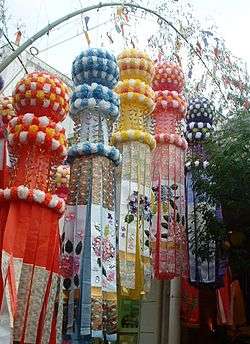Definify.com
Definition 2026
七夕
七夕
Chinese
| seven; 7 | dusk; evening | ||
|---|---|---|---|
|
simp. and trad. (七夕) |
七 | 夕 | |
Noun
七夕
- the Qixi Festival, the Chinese Valentine's Day, which falls on the seventh day of the seventh lunar month
Descendants
Japanese
Etymology 1

| Kanji in this term | |
|---|---|
| 七 | 夕 |
| Grade: 1 | Grade: 1 |
| Irregular | |
Origins somewhat obscure.
The latter bata portion is generally accepted to be from 機 (hata, “a loom”). The hata changes to bata due to rendaku (連濁).
The former tana portion may be from 棚 (tana, “a shelf, or a board placed lengthwise in a bridge”), in reference to an ancient ritual whereby a maiden would weave a special cloth on a hata in order to secure a bountiful harvest, as an offering for a god coming across a body of water via a tana. A related theory states that tana is instead an alteration of 種 (tane, “seed”). Yet another theory states that tana is an alteration of 手 (ta, “hand”, unbound Old Japanese form) + な (na, Old Japanese possessive particle superseded by no).[1]
The common spelling of 七夕 is an example of jukujikun, since the festival is held on the seventh night of the seventh month of the lunar calendar, now generally observed on 7 July.
Pronunciation
Alternative forms
- 棚機, 棚幡, 織女
Noun
七夕 (hiragana たなばた, romaji tanabata)
- a type of loom (the original meaning)
- a type of weaving
- by extension, a weaver
- (figuratively) any extremely rare visit, or the person so visiting
Proper noun
七夕 (hiragana たなばた, romaji Tanabata)
Synonyms
- 七夕祭り (たなばたまつり, Tanabata matsuri)
- 星祭り (ほしまつり, Hoshi matsuri)
- 七日盆 (なぬかぼん, Nanuka Bon)
See also
- List of festivals in Japan on Wiktionary
- List of festivals in Japan on Wikipedia
Etymology 2
| Kanji in this term | |
|---|---|
| 七 | 夕 |
|
しち Grade: 1 |
せき Grade: 1 |
| on'yomi | |
From Middle Chinese compound 七夕 (*tsit *ziɛk, literally “seventh evening”). Compare modern Chinese 七夕 (qīxī).
Pronunciation
Proper noun
七夕 (hiragana しちせき, romaji Shichiseki)
- the Tanabata Japanese star festival, observed on 7 July
- the Chinese Qīxī Festival, also sometimes referred to as the Double Seventh Festival
References
- ↑ 1988, 国語大辞典(新装版) (Kokugo Dai Jiten, Revised Edition) (in Japanese), Tōkyō: Shogakukan
- 1 2 2006, 大辞林 (Daijirin), Third Edition (in Japanese), Tōkyō: Sanseidō, ISBN 4-385-13905-9